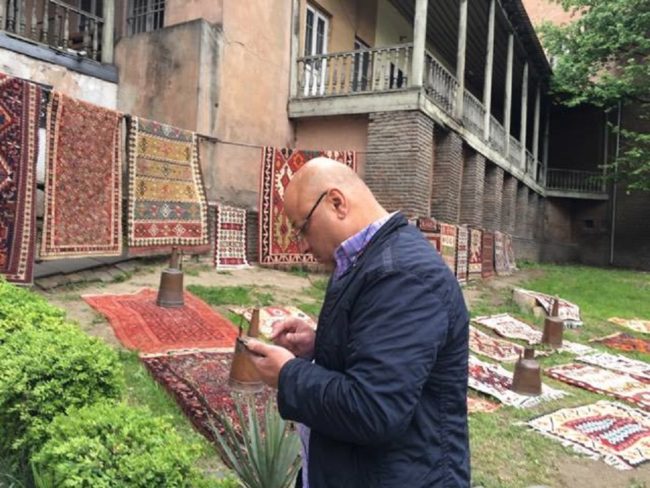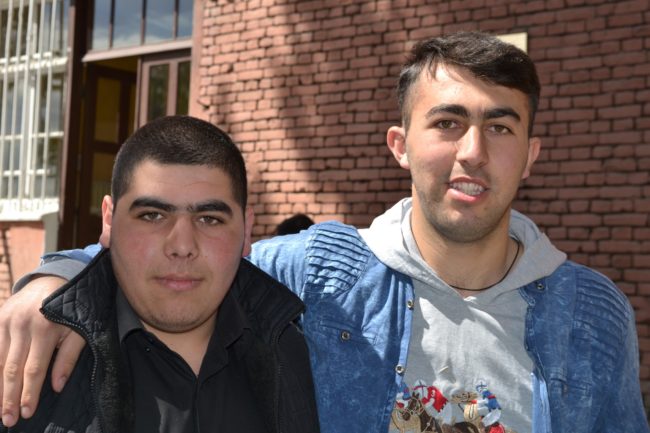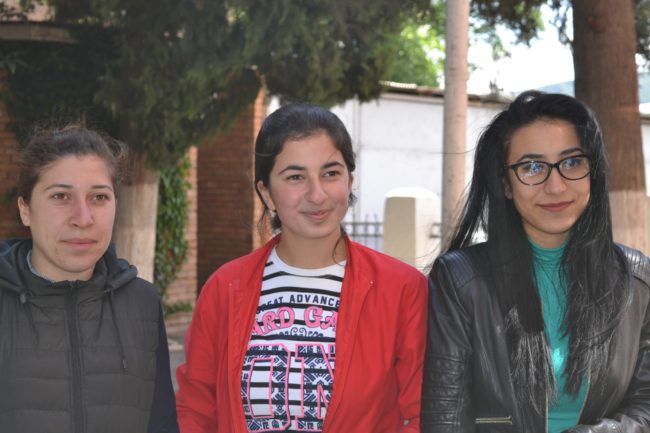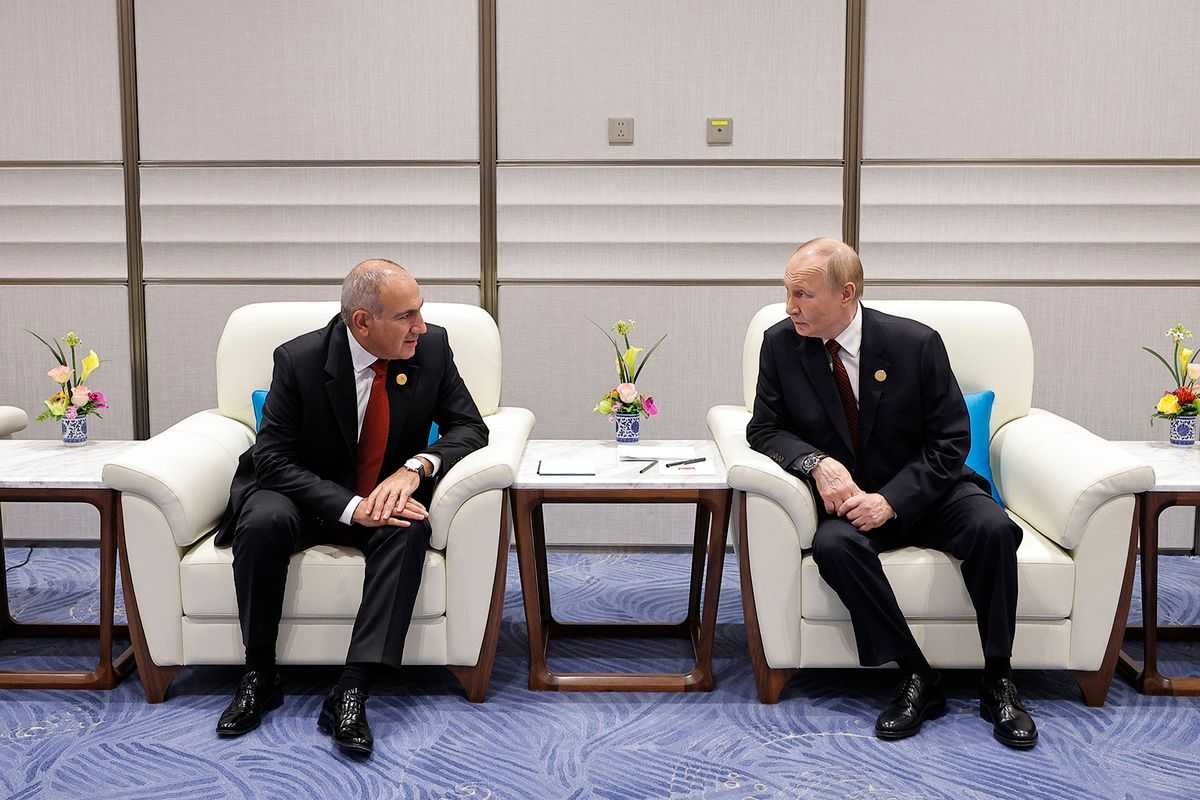‘If war breaks out again, I will go’ — the polarisation of young Armenians and Azerbaijanis in Georgia


 Despite Georgia’s attempts to better integrate and include ethnic minorities, young ethnic Armenians and Azerbaijanis in the country are becoming more politically invested in the affairs of Armenia and Azerbaijan than in their Georgian homeland.
Despite Georgia’s attempts to better integrate and include ethnic minorities, young ethnic Armenians and Azerbaijanis in the country are becoming more politically invested in the affairs of Armenia and Azerbaijan than in their Georgian homeland.
‘If war breaks out again, I will go [to war]. There is no difference; I am an ethnic Azerbaijani too. It is not important for me if we live in Georgia or wherever else we go. My brothers are living there, they are in my heart’, young Azerbaijani man Richard Bayramov told OC Media.
Richard is 19, and was born in the city of Gardabani, in Georgia’s southern region of Kvemo Kartli, which has an ethnic Azerbaijani majority.
‘We are in favour of the truth’, Richard said, showing no doubt that Azerbaijan is on the right side in the conflict.
Richard and his friends, especially those born in Kvemo Kartli, graduated from Azerbaijani-language schools. They mostly follow news and political developments in Azerbaijan. Richard pays special attention to what’s happening along the country’s border with Armenia.
He is just one example of young members of Georgia’s Armenian and Azerbaijani communities who have grown increasingly involved in Armenian and Azerbaijani politics.
Shadows of the past
Since 1991, the two former Soviet republics have been in conflict over Nagorno-Karabakh — a majority Armenian region within Azerbaijan which declared independence following the Soviet Union’s disintegration. When tensions flare on the Armenian–Azerbaijani border, as in the April 2016 Four Day War, members of Georgia’s Armenian and Azerbaijani communities issue statements expressing solidarity or their readiness to participate in the war.
According to Georgia’s 2014 census, 233,000 ethnic Azerbaijanis and 168,100 ethnic Armenians live in Georgia, mostly in the southern regions of Kvemo Kartli and Samtskhe–Javakheti, respectively. Young people from these regions often display accentuated opinions on the Armenian–Azerbaijani conflict.
‘I had most of my problems with Azerbajanis over Nagorno Karabakh. Like most of my friends, I could not have Azerbaijani friends like we have Georgian ones, because of the conflict between the two countries. There is no good friendship, maybe not yet. If we love our motherland [Armenia], they, of course, love theirs. Moreover, every photo or video [from the conflict zone] shows how our Armenian brothers and sisters died, and it has a huge emotional influence on us. The same happens with Azerbajanis’, Samtskhe–Javakheti born Eduard Shahbekyan told OC Media.
Eduard graduated from an Armenian-language school in Orlovka, a small village in Samtskhe–Javakheti. Now he is a student at Tbilisi State University and attends classes with some ethnic Azerbaijanis. Eduard follows Armenian news, but he is also interested in other countries’ politics too — including Georgia’s.
‘Of course I am interested in Georgia’s politics, but like my grandfather, I don’t like what any Georgian government is doing in general, because here no-one really cares about the people…’, Eduard said.

Attempts at inclusiveness
The Georgian government has been trying to step up its efforts to involve ethnic minorities in the country’s political life and has given opportunities to members of ethnic minorities to study in their own languages. Eduard argues that Armenian-language education was essential to the development of his national identity.
‘Georgia is a multinational and tolerant country. For example, my relatives in Russia do not have the opportunity to learn Armenian, they do not know about Armenian history, culture, and do not feel fully Armenian’, Edward said. He is grateful that his parents raised him an Armenian patriot, but he believes that he is more patriotic than they are.
Norayr Gasparyan, who is from the Armenian village of Shaumiani in Kvemo Kartli, insists that Armenians and Azerbaijanis in Georgia, especially young people, are more involved in the two neighboring countries’ politics than in their native Georgia’s because they lack knowledge of Georgian language. According to him, the two communities receive most of their news from Azerbaijani and Armenian sources.
‘That is the main obstacle to integration of these two largest minorities into the Georgian nation. On the one hand, these people think that integration will cut them off from their roots, on the other — the integration policies of several Georgian governments were not effective for many reasons. It is impossible to learn Georgian with one 45-minute Georgian class per day’, said Norayr, who graduated from an Armenian language school and is now studying in Tbilisi at Ilia State University, under the ‘1+4 Programme’ for young people from the ethnic minorities.
The programme was launched in 2010 and allows prospective students from ethnic minorities to pass a general aptitude test in their native languages, take a one-year intensive course in Georgian, and then join a regular course at Georgian universities.
‘Only this programme has had results. Now that I know Georgian, I feel more involved and integrated. Now (as translator) I translate news from Georgian to Armenian every day’, said Norayr, who works for the Tbilisi-based Armenian-language Aliq Radio.

Memories of better times
Tbilisi has for ages been a multinational city. Ethnic Armenians, Azerbaijanis, Russians, Yezidis, and Jews continue to live together alongside Georgians in same districts, often in the capital’s famous ‘Italian courtyards’.
‘Georgian Armenians experienced pain in recent days [on 24 April, Armenian Genocide Memorial Day] in their hearts, and Georgian Azerbajanis experienced pain too, but we should not take it out on each other or cause new conflicts here with aggressive behaviour. There are Azerbaijanis living in Azerbaijan and of course I think about Azerbaijan’, said Laila Akberova, who was born in Tbilisi and grew up in one of the capital’s courtyards, along with Armenian, Russian, and Yezidi children.
‘When something happens between Armenia and Azerbaijan, my parents and I prefer to stay at home and not have discussions outdoors, which we do concerning various topics’, Laila adds.
Emzar Mamedzade, an ethnic Azerbaijani who was born in the Meidani District of Tbilisi’s Old Town, and lives side by side with different ethnic groups, owns an old shop selling carpets from across the South Caucasus. He has an ethnic Armenian friend from his childhood, who is also his business partner․
‘We are Georgian citizens first, and we think about the country where we live’, Emzar told OC Media.
‘Carpets unite peoples. I am Azerbaijani and I work with an Armenian. We are friends and nothing prevents us from living in peace’, said Emzar, who speaks not only Georgian, Azerbaijani, and Russian — but also Armenian.









